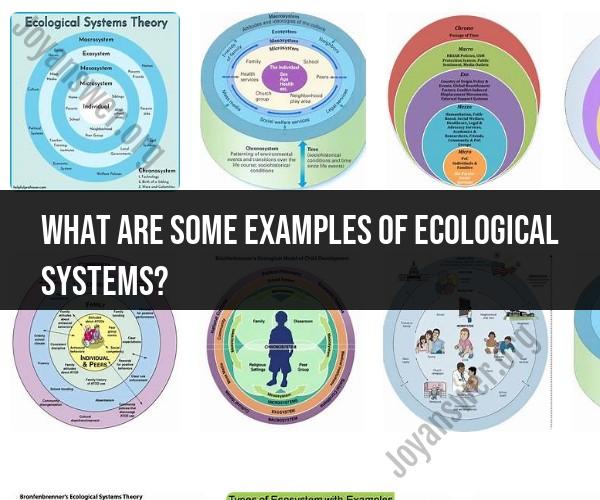What are some examples of ecological systems?
Ecological systems, also known as ecosystems, exist in a wide range of environments around the world. These systems can be found in diverse landscapes and can vary significantly in terms of size, complexity, and the types of organisms they support. Here are some examples of ecological systems:
Tropical Rainforest: Tropical rainforests are lush and biodiverse ecosystems found near the equator. They contain a vast array of plant and animal species, such as jaguars, toucans, and a wide variety of insects and plants. These ecosystems are characterized by heavy rainfall, high humidity, and year-round warm temperatures.
Coral Reef: Coral reefs are underwater ecosystems found in warm, shallow, and clear waters. They are home to an incredible diversity of marine life, including colorful coral polyps, fish, sea turtles, and many other species. Coral reefs are vital for marine biodiversity and play a crucial role in protecting coastlines from erosion.
Grassland: Grasslands are ecosystems dominated by grasses rather than trees or shrubs. Examples include the African savanna and the North American prairie. These ecosystems support herbivores like zebras and bison, as well as predators like lions and wolves.
Desert: Deserts are arid ecosystems with low precipitation levels. Despite harsh conditions, deserts are home to specialized flora and fauna adapted to extreme temperatures and water scarcity. Examples include the Sahara Desert in Africa and the Sonoran Desert in North America.
Taiga (Boreal Forest): The taiga is a cold, subarctic ecosystem characterized by coniferous forests. It spans across northern regions of North America, Europe, and Asia. Common species include pine and spruce trees, as well as animals like moose, bears, and wolves.
Freshwater Lake: Freshwater lakes are aquatic ecosystems that vary in size from small ponds to vast, deep lakes. They support a range of life, including fish, aquatic plants, birds, and amphibians. Lake ecosystems can be influenced by factors like water quality, temperature, and nutrient levels.
Mountain Ecosystem: Mountain ecosystems occur at high elevations and can include alpine meadows, glaciers, and rocky slopes. These regions are home to unique species adapted to extreme cold and low oxygen levels, such as snow leopards and alpine plants.
Mangrove Forest: Mangroves are coastal ecosystems found in tropical and subtropical regions. They consist of salt-tolerant trees and shrubs that provide habitat for various fish, birds, and crustaceans. Mangroves also serve as natural buffers against coastal erosion and storm surges.
Urban Ecosystem: Urban areas can be considered ecosystems in their own right, where human activities interact with natural and built environments. Urban ecosystems have their own dynamics, including wildlife adaptation to city life, air and water quality issues, and the urban heat island effect.
Agricultural Ecosystem: Agricultural ecosystems involve human cultivation of crops and livestock. These systems can vary from traditional subsistence farming to modern industrial agriculture. Managing agricultural ecosystems sustainably is essential for food security and environmental preservation.
These are just a few examples of the diverse ecological systems that exist on Earth. Each ecosystem has its unique characteristics, species interactions, and environmental challenges. Understanding these systems is crucial for conservation efforts, sustainable resource management, and addressing environmental issues.
Exploring Ecological Systems: Examples from Nature
An ecological system is a community of living organisms interacting with each other and their physical environment. It is a complex and dynamic system, with all of the parts interconnected. Ecological systems can be found all over the world, from the smallest pond to the largest rainforest.
Here are a few examples of ecological systems from nature:
- Forest ecosystems: Forests are home to a wide variety of plants and animals, including trees, shrubs, wildflowers, ferns, fungi, insects, birds, mammals, and reptiles. Forest ecosystems play an important role in the global climate and water cycle, and they provide many resources for humans, such as timber, food, and medicine.
- Grassland ecosystems: Grasslands are another type of terrestrial ecosystem that is found all over the world. They are characterized by their open spaces and tall grasses. Grassland ecosystems are home to a variety of grazing animals, such as bison, zebras, and antelopes.
- Aquatic ecosystems: Aquatic ecosystems are found in water bodies such as lakes, rivers, oceans, and wetlands. These ecosystems are home to a wide variety of fish, amphibians, reptiles, birds, and mammals. Aquatic ecosystems play an important role in the water cycle and in providing food and habitat for many different species.
Biodiversity and Balance: Instances of Ecological Systems
Biodiversity is the variety of life on Earth. It is important for the health and stability of ecological systems. When there is a high level of biodiversity, ecosystems are more resilient to disturbances and changes in the environment.
Here are a few examples of how biodiversity plays a role in ecological systems:
- In a forest ecosystem, different species of trees have different root systems that help to prevent erosion and hold soil in place. Different species of insects also play different roles in pollination and decomposition.
- In a grassland ecosystem, different species of grazing animals help to keep the grasslands healthy by eating different types of grasses and other plants.
- In an aquatic ecosystem, different species of fish play different roles in the food chain. They also help to keep the water clean by eating algae and other organic matter.
Nature's Complexity: Sample Ecological Systems in the Wild
Ecological systems are complex and dynamic. There are many factors that can influence the health and stability of an ecosystem, including climate, weather, and human activity.
Here are a few examples of the complexity of ecological systems:
- The Amazon rainforest is one of the most biodiverse ecosystems on Earth. It is home to over 3 million species of plants and animals. The rainforest plays an important role in the global climate and water cycle.
- The Great Barrier Reef is the world's largest coral reef system. It is home to a wide variety of marine life, including fish, corals, and invertebrates. The reef is important for tourism and for protecting the coastline from erosion.
- The Serengeti National Park in Tanzania is home to a large population of wildebeest, zebra, and other grazing animals. These animals migrate across the Serengeti each year in search of food and water. The migration is one of the largest wildlife spectacles in the world.
Ecological systems are essential for life on Earth. They provide us with food, water, air, and other resources. They also play an important role in the global climate and water cycle. It is important to understand and protect ecological systems so that they can continue to provide us with the benefits that we rely on.












